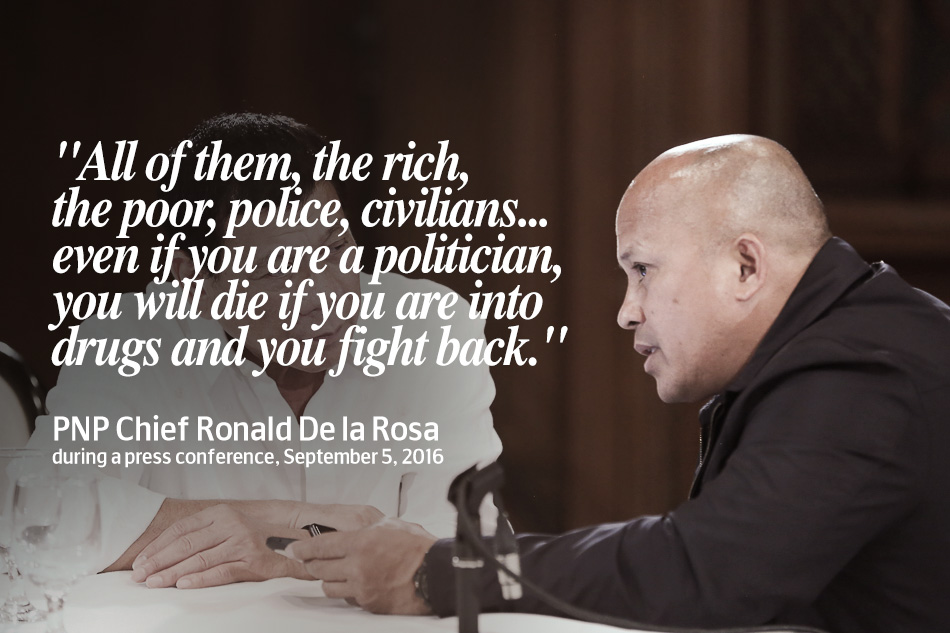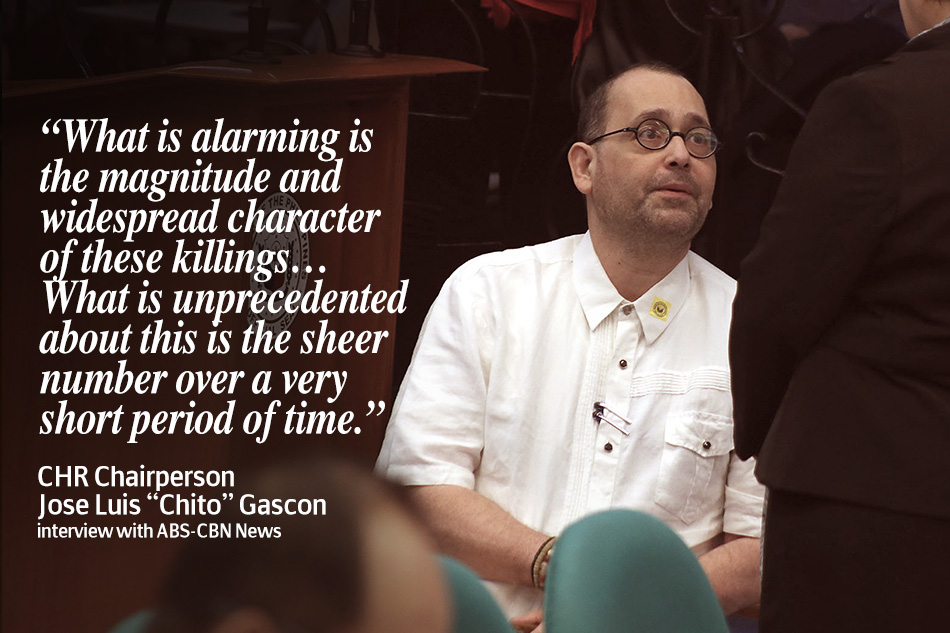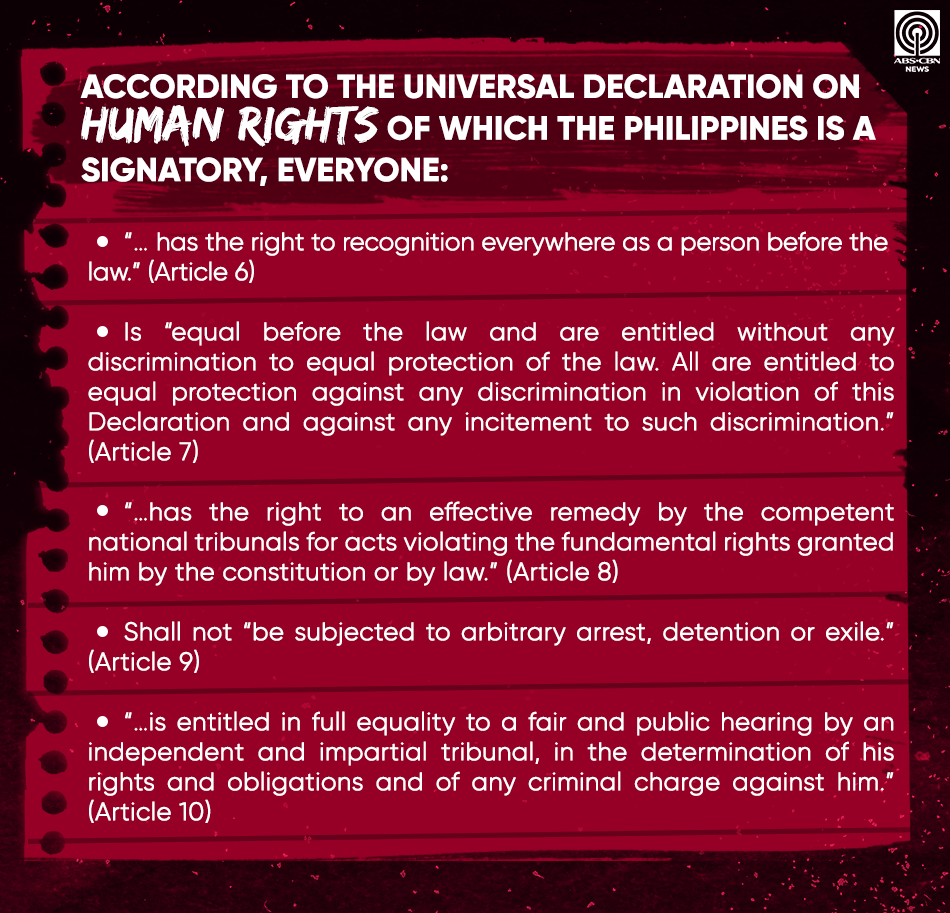ABS-CBN News
ABS-CBN News Digital Media
LIKE NO OTHER, Rodrigo Roa Duterte has indeed pursued his campaign promise to wage war against drugs with as much passion as when he did so in Davao City, where he was its mayor for more than 20 years.
Three months into the presidency, Duterte’s all-out war caused the surrender of 731,839 suspected drug pushers and users, congesting jails and rehabilitation centers way, way beyond their capacity.
Over 22,000 drug suspects have also been arrested.
But the number of surrenders and arrests took the back seat when the number of the slain drugs suspects started coming in from across the country.
From July 1 until October 2, 2016, the war on drugs has resulted in the death of 1,360 drug suspects in police operations, all because the suspects engaged the police in a gunfight, according to PNP records.
Thousands more have died outside police operations and authorities couldn’t name the killers yet as these were all under investigation.
Cops, soldiers die, too
The same war has killed 13 policemen and three soldiers over the same period. Many more policemen and soldiers have also been wounded. The body bags continue to pile up, the question now is, how should one measure the success Duterte’s war on drugs? When will he ever stop, if at all?
Less drugs, less crimes
If the police were to be believed, the rising number of the dead, arrested and surrendered has all scared criminals away.
The Philippine National Police has claimed victory in the war on drugs, citing a telling decrease in crime statistics across the board.
S/Supt. Dionardo Carlos, PNP spokesman, said the intensified campaign, including buy-bust operations and Oplan Tokhang, has been able to “paralyze” the drug trade and effectively cut down the crime rate considerably.
The PNP has claimed crime incidents decreased by 49 percent during the first month of the anti-illegal drug campaign, with less illegal drug dependents and peddlers roaming the streets.
“There are less people being raped,” Carlos said. “There are less people being robbed. There are less people being mugged. There are less petty crimes happening on the streets. Ang mga gumagawa nito ay mga drug addict at ‘yung drug pusher din.”
“Mukhang tuloy-tuloy na tayong mabubulok. Mahuhulog na tayo sa balon ng kapariwaraan if we will not do things the legal way, the right way.”
War anti-poor
But the bloody and violent method the government has been employing to implement the campaign against drugs has drawn flak. One of its critics was former Sen. Rene Saguisag, a long-time human rights lawyer. He said the government was doing the right thing, but it was not doing it right.
Saguisag said the government was merely scratching the surface of the problem. What the government needed was a more comprehensive plan and long-term solution to address illegal drugs, not a campaign that seemingly affected the poorer segments of society the most, he said.
“You can minimize it,” he said, “but you cannot boast na, give me six months and I’d eradicate this problem. Ang in-e-eradicate niya—mga pobre e, riffraff, mga hampaslupa. E kung ang tinepok niya dyan ay isang senador, isang taipan.”
No case vs big fish?
Until now, he added, the government has not filed a single case against suspected big-time druglord Peter Lim and against the five alleged narco-police director generals.
Quoting news reports, Saguisag said majority of those killed and arrested in police operations were poor.
“Ilang biktima, buried like paupers,” he said. “In other words, ang pamilya walang pantubos. E, talagang ‘yung mga pobreng pobre. Pero‘pag pumunta pa sa (rich men’s)enclaves, “Tao po, tao po.” Meron po ba kayong shabu yan. They are gentle.”
Hardline policy
Saguisag said the hardline policy against drugs has never been a success anywhere in the world.
“Many living personalities have concluded, the hardline policy is a failed one and should be replaced by another policy,” he said. “Ang attitude sa Portugal ay nagdadrugs ka, hindi ka masamang tao e. Hindi ka criminal. You’re sick, they are not imprisoned. They are treated in rehab clinics."
"Kaya to me, dapat we sit back and review kung it’s really the way to go: (It’s) kill, kill, kill! To me naman, heal, heal, heal. We are one family,” he said.
Forgotten children
For the Child Rehabilitation Center, an organization that helps young victims of violence, the government should also address why some children got addicted to drugs at an early age.
Most of these children and their parents, according to Eilek Renes Manano, CRC deputy director, were involved in the illegal drug trade because of poverty.
“Halimbawa ang mga nagrarugby, bakit ka nagrarugby? Kasi pampalipas gutom ‘to,” Manano said.
"Bakit may gutom? Bakit kailangan niya magbenta ng droga? Marami sa kanila walang economic opportunity,” she added.
‘Do it the legal way’
Saguisag said the government should review the way it has been trying to combat illegal drugs and ensure that the rule of law is upheld. “Si PNP chief Bato naghahamon pa ng duel: drug lord, duel tayo. Illegal yun. Sinabi pa niya: “Burn the houses of the drug lords, arson yun. If you’re a law enforcer and you are a law breaker, mali yun,” he said.
“Mukhang tuloy-tuloy na tayong mabubulok. Mahuhulog na tayo sa balon ng kapariwaraan if we will not do things the legal way, the right way,” he added.







